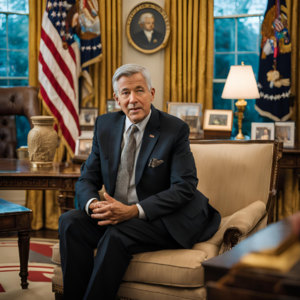Jerry Gardner (USE)
Jerry Gardner | |
|---|---|
 | |
| 68th President of the United States | |
| In office January 20, 2013 – January 20, 2018 | |
| Preceded by | Nicholas Metrilis III |
| Succeeded by | Keith E. Chism |
| Personal details | |
| Born | Jerry Gardner |
| Political party | Pro-States |
| Relatives | Gardner family |
Jerry Gardner was the 68th president of the United States from 2013 to 2018 and was the last president under the global economic depression, which started as early as 2004. Gardner, as a pro-state politician, focused on economic initiatives meant to boost and sustain local economies of the states as opposed to sustaining the federal economy, with the justification being that the states are the backbone of the entire union, no states means no Elisia. This approach to the depression, while mocked at the time, is now lauded by economists as the greatest decision ever made to bring the US back to economic stability. Within the last year of his term, the US began seeing economic growth in its GDP, one of the first nations to post such results.
Gardner had no previous history in national politics prior to running for President, however at the state level he served four terms as Governor of North Eretria.
Early life
College & Politics
Presidency (2013-2018)
Inauguration
Gardner was inaugurated as the XX President of the United States on January 20th, 2013.
First 100 Days
Controversially, on day one in office, President Gardner announced the passing of an Executive Order directing the Department of Education to pause all payments of grants, and to restrict the payout of loans until such time that the department, which was also a directive, worked to address "systemic issues of profit in the troubling economy." This Executive Order was to pave the way for a complete reform of the federal student aid program which has existed since the mid-1900's to make it something plausible in the economic depression.
Domestic Policy
Economy
The largest priority for the Gardner Administration, which was the same priority dating back two administrations, was on improving the economic situation. He got left with the mess that the Metrilis situation caused, which made the economic situation worsen at a faster pace than expected, including by ways of attempting to strongarm big banks, imposing anti-business practices and refusing to do federal buyouts.
Education
Executive Order {number here} directed the Department of Education to pause payments of grants and to restrict the payout of loans from the student aid program until they addressed the "systemic issues of profit in the troubling economy." This executive order affected approximately 130 million students, and caused an enrollment decline of 11%. Additionally, due to the suspension of grant aid, the government saved $175,000. His education policy was the most controversial one in decades, and the policy's ultimate goal was to abolish the student aid program. The program was rooted in federal statute ratified in the mid-1900's and Gardner's goal was almost accomplished, however, after major protests from university administrators, students and parents, Congress took a step back and ended up sidelining the proposal that would have abolished it. Before the protests occurred, Gardner was able to get a law passed to grant the President more authority to oversee the federal student aid program, and permitted the program to be suspended entirely for reasons of financial security. He would ultimately never exercise this emergency power, but he did use his new powers to oversee the program to hike interest rates on loans and to restrict the eligibility requirements to receive grants so as to help the government budget.